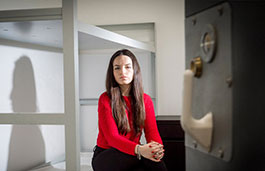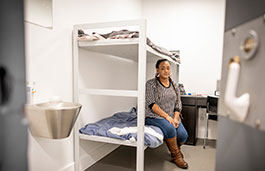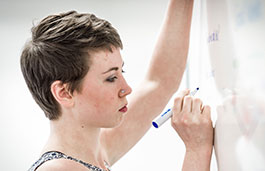Search
Applied Psychology MSc
Study level: Postgraduate
Improve your skills in clinical, counselling, educational, coaching and research psychology. Our interactive sessions and professional placement opportunity2 aim to help you prepare for a career in psychology.
Year of entry
Location
Coventry University (Coventry)
Study mode
Full-time
With Professional Placement
Duration
1 year full-time
Up to 2 years full-time with professional placement
Course code
CAST030
Start date
January 2026
March 2026
May 2026
July 2026
Course overview
This course is for aspiring psychologists and professionals seeking to expand their knowledge of psychology and develop skills through practical workshops. It provides a solid foundation in psychology and helps you explore career paths in public health, media, education, workplaces, research and specialised psychology fields.
- Learn about key areas of psychology from a modern perspective, including how psychology is used in media, global politics, research and new technologies.
- Develop key practical skills in psychology through hands-on workshops, case analysis, role-playing, simulations and assessments in clinical, counselling, educational and research psychology.
- You can complete an optional 12-month professional placement to gain real-world experience in clinical, counselling, educational, coaching or research settings.2
5 QS Stars for Teaching and Facilities
QS Stars University RatingsRanked 9th Modern University in UK by the Times
The Times and Sunday Times Good University Guide 2025Ranked 4th for Overall Satisfaction in PTES
Postgraduate Taught Experience Survey (PTES) 2025Why you should study this course
Learning, teaching and industry connections: learn from subject experts with industry experience, bringing both research and real-world experience into the classroom. Our teaching reflects key industry trends and debates, ensuring a current and relevant learning experience. Staff also maintain strong links with employers, including local schools, prison services, and clinical and counselling services.
Innovative learning tools and dedicated technicians: get access to specialised psychology software for statistics and research methods to support your studies. Dedicated psychology technicians can help you use these tools, set up experiments and work with equipment in psychology labs.4
Professional experience: opportunities for practical experience are embedded throughout the course to boost your professional psychology skills, including case formulation, simulation, role play and standard assessment.
Gain practical experience: boost your CV with an additional professional placement. See the modules for more details.2
What you'll study
Enhance your knowledge in applied psychology focusing on key areas such as clinical, counselling, developmental, educational and coaching. Explore how media shapes political outlook, and how technological advancements drive innovation in psychological research and evidence-based practice.
We regularly review our course content, to make it relevant and current for the benefit of our students. For these reasons, course modules may be updated.
How you'll learn
Teaching and learning methods may include:
- lectures
- seminars
- tutorials
- presentations
- case formulation
- simulation and role-play
- case studies
- workshops.
Teaching contact hours
As a full-time postgraduate student, you will study modules totalling 180 credits each academic year. A typical 30-credit module requires a total of 300 hours of study. Study hours are made up of teaching contact hours, and guided and independent study.
Teaching hours
Teaching hours may vary, depending on where you are in your studies, but on average you will have between 8 and 12 teaching and learning hours each week. You will also have the opportunity to attend optional sessions including time with a Success Coach or to meet with staff for advice and feedback.
Guided and independent study
Throughout your studies, you will be expected to spend time in guided and independent study to make up the required study hours per module. You will be digging deeper into topics, reviewing what you’ve learnt and completing assignments. This can be completed around your personal commitments. As you progress to the end of your studies, you’ll spend more time on independent learning.
Online learning
As an innovative university, we use different teaching methods, including online tools and emerging technologies. So, some of your teaching hours and assessments may be delivered online.
Assessment
This course will be assessed using a variety of methods which could vary depending on the module. Assessment methods may include:
- presentations
- case formulation
- case studies
- essays
- lobby proposals
- reflection.
The Coventry University assessment strategy aims to ensure that our courses are fairly assessed and allows us to monitor student progression towards achieving the intended learning outcomes.
Entry requirements
Typical entry requirements:
Fees and funding
| Student | Full-time | Part-time |
|---|---|---|
| UK, Ireland*, Channel Islands or Isle of Man | £11,200 £1,500 professional placement fee (if placement secured) |
Not available |
| EU | £11,200 per year with EU Support Bursary** £1,500 professional placement fee (if placement secured) per year with EU Support Bursary** £18,600 per year without EU Support Bursary** £1,800 professional placement fee (if placement secured) per year without EU Support Bursary** |
Not available |
| International | £18,600 £1,800 professional placement fee (if placement secured) |
Not available |
For advice and guidance on tuition fees3 and student loans visit our Postgraduate Finance page and see the university's Tuition Fee and Refund Terms and Conditions.
We offer a range of international scholarships to students all over the world. For more information, visit our International Scholarships page.
Tuition fees cover the cost of your teaching, assessments, facilities and support services. There may be additional costs not covered by this fee such as accommodation and living costs, recommended reading books, stationery, printing and re-assessments should you need them.
The following are additional costs not included in the tuition fees:
- Any optional overseas field trips or visits: £400+ per trip.
- Any costs associated with securing, attending or completing a placement (whether in the UK or abroad).
*Irish student fees
The rights of Irish residents to study in the UK are preserved under the Common Travel Area arrangement. If you are an Irish student and meet the residency criteria, you can study in England, pay the same level of tuition fees as English students and utilise the Tuition Fee Loan.
**EU Support Bursary
Following the UK's exit from the European Union, we are offering financial support to all eligible EU students who wish to study an undergraduate or a postgraduate degree with us full-time. This bursary will be used to offset the cost of your tuition fees to bring them in line with that of UK students. Students studying a degree with a foundation year with us are not eligible for the bursary.
Facilities
The Richard Crossman Building is the primary home of psychology, criminology and social science subjects. Facilities include:
Light and dark multisensory labs
Explore how light and darkness affect behaviour, emotion and cognition. These specialist environments provide controlled yet adaptable spaces to learn about light, colour and perception.
Prison cells
Two furnished cells, one simulating a prison cell, and one simulating a custody cell, allow you to role-play real-life situations and put yourself in the shoes of prisoners and prison/police staff. Prisoner artwork is also on display.
Psychology lab
A suite of rooms with experimental equipment, such as eye tracking and EEG (electroencephalogram) resources, to support neuro-psychological, physiological and biological psychological research for undergraduate and postgraduate students. Specialist software, such as Gorilla, OpenSesame experiment builder, E-Prime, SPSS statistical analysis, Pinnacle Studio and NVIVO allow you to develop your digital fluency.

Lanchester Library
The library is usually open 364 days a year. It’s where you can access your course’s specialist Academic Liaison Librarian. It’s also home to specialist teams which can support you with your academic writing and maths and statistics questions.

The Hub
The Hub is the centre of student life on campus. Facilities include a food court, convenience store, multi-faith centre, medical centre, hairdresser, coffee shops and the Your SU offices. It has fully licensed function spaces and a bar.

Careers and employability
Get one-on-one guidance lasting up to 18 months from the end of your course. We’ll help you find placements and graduate roles, offer CV and application checks, mentoring, skills workshops, employer events and more.
Facilities are subject to availability. Access to some facilities (including some teaching and learning spaces) may vary from those advertised and/or may have reduced availability or restrictions where the university is following public authority guidance, decisions or orders.
Careers and opportunities
The Applied Psychology MSc aims to prepare you for a career in applied psychology, from assistant psychologist posts to mental health practitioner roles. Our graduates work in roles ranging from NHS-based therapists to innovators within charitable non-profit organisations and education.
Examples of potential career opportunities in psychology or applied psychology settings include:
- assistant psychologist
- private psychological services
- NHS therapy-based roles
- mental health practitioners
- academia and research
- policing
- human resources
- charities and non-profit organisations
Where our graduates work
- St Andrew’s Healthcare - a charity that works to inspire hope for those living with complex mental health needs.
- Aquarius – a charity that helps with drugs, alcohol and gambling.
- Wolverhampton Haven – victim support for interpersonal violence, drug use, trauma and homelessness.
- Refuge – domestic abuse organisation for women.
- Metropolitan Police
- Further study – PhD/PsyD/DClinPsych.
- education and learning advisors.
The graduate destinations listed above illustrate potential career paths. You may need to gain additional qualifications or practical experience, pass professional examinations, complete training, cover associated costs and meet specific visa or immigration requirements to secure employment in these fields.
How to apply
You may also like

Forensic Psychology MSc






